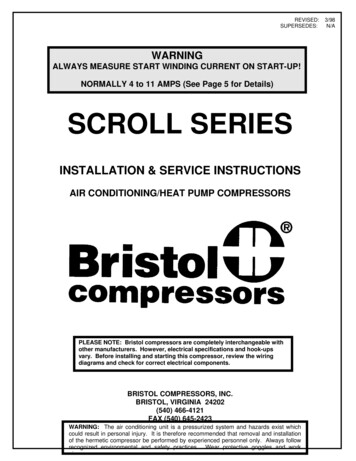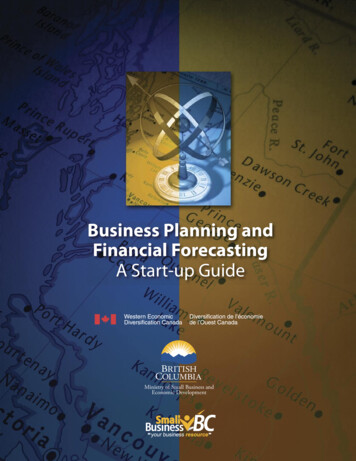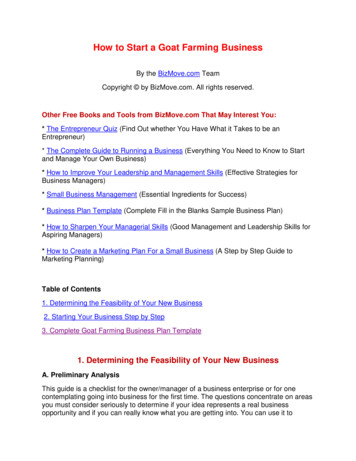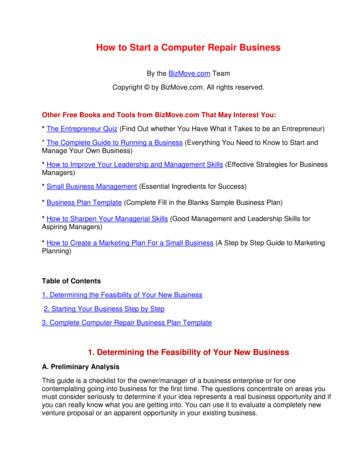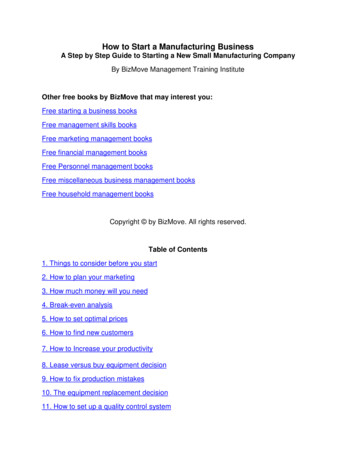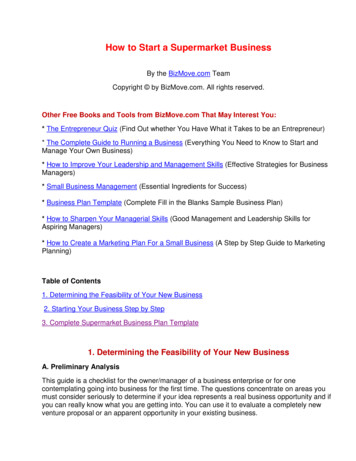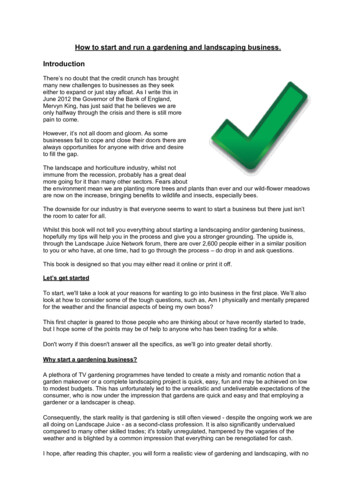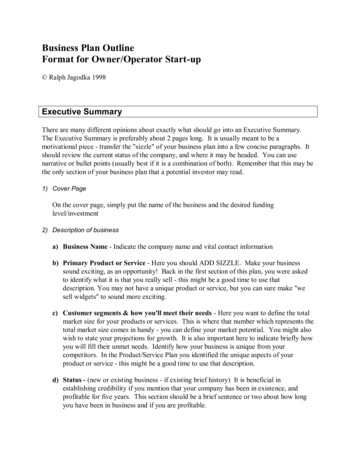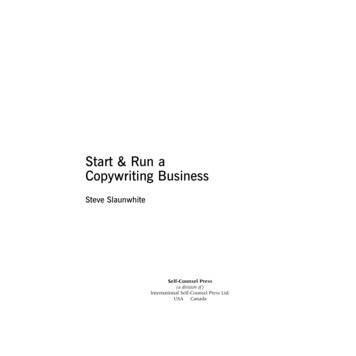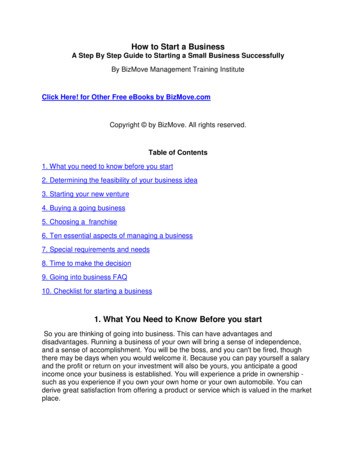
Transcription
How to Start a BusinessA Step By Step Guide to Starting a Small Business SuccessfullyBy BizMove Management Training InstituteClick Here! for Other Free eBooks by BizMove.comCopyright by BizMove. All rights reserved.Table of Contents1. What you need to know before you start2. Determining the feasibility of your business idea3. Starting your new venture4. Buying a going business5. Choosing a franchise6. Ten essential aspects of managing a business7. Special requirements and needs8. Time to make the decision9. Going into business FAQ10. Checklist for starting a business1. What You Need to Know Before you startSo you are thinking of going into business. This can have advantages anddisadvantages. Running a business of your own will bring a sense of independence,and a sense of accomplishment. You will be the boss, and you can't be fired, thoughthere may be days when you would welcome it. Because you can pay yourself a salaryand the profit or return on your investment will also be yours, you anticipate a goodincome once your business is established. You will experience a pride in ownership such as you experience if you own your own home or your own automobile. You canderive great satisfaction from offering a product or service which is valued in the marketplace.
By being boss you can adopt new ideas quickly. Since your enterprise undoubtedly willbe a small business - at least in the beginning - you will have no large, unwieldyorganization to retrain, no board to get permission from, each time you wish to trysomething new. If the idea doesn't work you can drop it just as quickly. This opportunityfor flexibility is one of small businesses greatest assets.These are some of the advantages and pleasures of operating your own business. Nowtake a look at the other side. If you have employees, you must meet a payroll week afterweek. You must always have money to pay creditors - the man who sells you goods ormaterials, the dealer who furnishes fixtures and equipment, the landlord if you rent, themortgage holder if you are buying your place of business, the publisher running youradvertisements, the tax collector, and many others. All of these must be paid before youcan consider the "profits" yours.You must accept sole responsibility for all final decisions. A wrong judgment on yourpart can result in losses not only to yourself but, possibly, to your employees, creditors,and customers as well. Moreover, you must withstand, alone, adverse situations causedby circumstances frequently beyond your control, To overcome these businesssetbacks and keep your business profitable means long hours of hard work. It couldvery well not be the work you want to do. As someone else's employee you developed askill. Now, starting a business of your own, you may expect to use that skill 40 or morehours a week. Instead, you must perform the management tasks as well. You mustkeep the books, analyze accounting records, sit back and do long range planning, jumpand handle the expediting and, when everyone has gone home and you finally havecaught up with the paper work, you may even have to sweep the floor.As your business grows and you become more successful, you may not do some ofthese activities. As an owner-manager, however, you must - at least at first - give up thetechnical aspects you know and enjoy doing, and focus on the management aspects.To get your business off to a successful start, you must be a manager not an operator.You will never be entirely your own boss.No matter what you choose - manufacturing, wholesaling, retailing or service business you must always satisfy your customers. If you don't give the customers what they want,they'll go somewhere else and you'll be out of business. So every customer, or evenpotential customer, is your boss. Your creditors will also dictate to you, and yourcompetitors' actions may force you to make decisions you don't want to make. Nationaland local government agencies will insist that you meet certain standards and followcertain regulations. The one thing you can decide yourself is how you will satisfy all ofthese bosses.Are You the Type?The first question you should answer after recognizing that there are two sides to theprospect of establishing your own business is "Am I the type?"You will be your most important employee. It is more important that you rate yourselfobjectively than how you rate any prospective employee. Appraise your strengths and
your weaknesses. As a prospective operator of your own business, acknowledge thatyou are weak in certain areas and cover the deficiency by either retraining yourself orhiring someone with the necessary skill.Numerous studies have been made of small business managers over the years. Manylook at traits and characteristics that appear common to most people who start their ownbusinesses. Other studies focus on characteristics that seem to appear frequently insuccessful owner-managers.First, consider those characteristics that seem to distinguish the person who opens abusiness from the person who works for someone else. These studies investigatedsuccessful and unsuccessful owners, some of whom went bankrupt several times.Some were successful only after the second or third try. The characteristics they sharemight almost be said to predispose a person into trying to start a business. Of course,not all of these characteristics appear in every small business owner-manager, but thefollowing seem to be most predominate.Strong Opinions and AttitudesPeople who start their own business may be members of different political parties, feeldifferently about religion, economics and other issues. They are like everyone else. Thedifference is they usually feel and express themselves more strongly. This is consistent.If you are going to risk your money and time in your own business you must have astrong feeling that you will be successful. As you will see later, these strong feelingsmay also cause problems.If you want to start your own business you probably have mixed feelings aboutauthority. You know the manager must have authority to get things done, but you're notcomfortable working under someone. This may also have been your attitude in ascholastic, family or other authority structure.If you want to open you own business you are likely to have a strong "Need forAchievement". This "Need for Achievement" is a psychologist's term for motivation andis usually measured by tests. It can be an important factor in success.The person who wouldn't think of starting a business, might call you a plunger, agambler, a high risk taker. Yet you probably don't feel that about yourself. Studies haveshown that very often the small business owner doesn't differ from anyone else in riskavoidance or aversion when measured on tests. At first thought this seemsunreasonable since logic tells us that it is risky to open your own business. An OhioState professor once explained this apparent contradiction very simply. "When a personstarts and manages his own business he doesn't see risks; he sees only factors that hecan control to his advantage."If you possess these traits to some degree or other it doesn't mean you will besuccessful, only that you will very likely start your own business. Some of thesecharacteristics in excess may actually hamper you if you are not careful.
The characteristics that appear most frequently among "successful" small businessmanagers include drive, thinking ability, competence in human relations,communications skills and technical knowledge.Drive, as defined in the study, is composed of responsibility, vigor, initiative, persistenceand health. Thinking ability consists of original, creative, critical, and analytical thinking.Competency in human relations means emotional stability, sociability, good personalrelations, consideration, cheerfulness, cooperation. and tactfulness. Importantcommunications skills include verbal comprehension, and oral and writtencommunications. Technical knowledge is the manager's comprehension of the physicalprocess of producing goods or services, and the ability to use the informationpurposefully.Motivation or drive has long been considered as having an important effect onperformance. Psychologists now claim you can increase the motivation and thepersonal capacities that will improve your effectiveness and increase your chances forsuccess. Much of the development of such achievement motivation depends on settingthe right kind of goals for yourself.What Business Should You Choose?Many of you have already decided what business to choose. Others may still beseeking answers from counselors. Whether you have decided or not, you will find ithelpful to continue your self-evaluation.Begin by summarizing your background and experience. Include jobs. schooling, andhobbies. Then write down what you think you would like to do. Does what you would liketo do match up with what you have done? It is helpful if your experience and trainingcan be put to direct use in your new enterprise.What are your prospective needs? What are your prospective customers' needs? Youmay make money doing something you don't like if people will pay for it. On the otherhand, you will never make money if people don t need your product or service no matterhow happy you are doing it. Experts have said more companies fail because they are inthe wrong business than because they are "doing business wrong".Read, listen to the experts, talk to business people, try to determine where growth willoccur. Most new businesses can only get customers by taking them away fromsomeone else, or by attracting new people entering the area. In other words, don't starta contracting business in a community where the population is decreasing even if youare a good contractor.At this point, try to match your background and interests with what you see the needs tobe. If they match, wonderful. Now all you have to do is discover how to offer thecustomers more for their money than do your competitors.If the needs and your background don't match, don't despair. Get training by working ina company that provides a product or service that is needed. Find a job in a well
managed, successful company of the kind you are contemplating. Then absorb as muchmanagement know-how as you can while learning the technical skills.Education can help too. While there may be no educational requirements for startingyour own business, the more schooling you have along the right lines the betterequipped you should be.(Some fields require licenses, certificates, even degrees in specific educational areas.)Certainly it is helpful if you have had courses in record keeping, sales andcommunication. These needn't be college or even high school courses. They can comefrom adult education programs and the like.Is there a need for what you want to sell or do? Are you prepared to fill that need? Areyou interested in the area? Can you learn what you need to? Will there be a continuingand growing need for your product or service?Your Chances of SuccessWhat are your chances of success if you go into business? New businesses are alwaysbeing started. Almost as many are failing or being discontinued. A year of poor businessconditions is likely to be followed by a greater than average number of failures orclosings. A year of good business conditions tends to be followed by large increases inthe total number of businesses. In general, the number of firms increases with increasesin human population, total personal income and per capita income and since thesefactors have increased regularly, the total number of small businesses usually risesevery year.This growth is not free of growing pains, however. At the same time new businesses arebeing born other businesses are being discontinued. Some of these discontinuancesare legally business failures; other owners give up to avoid or minimize losses and arenot failures in the strict sense. Still others discontinue for reasons such as the death orretirement of the proprietor, the dissolution of a partnership, or the sale of the businessto a new owner.Younger businesses tend to discontinue first. Many do not make it through the first year.The discontinuation rate of those that survive this first year "burn-in" declines steadilyuntil at the end of several years the rate has dropped dramatically. So, your chances ofsuccess improve the longer you stay in business.Poor management is the largest single cause of business failure. Year after year, thelack of managerial experience and aptitude has accounted for around 90 percent of allfailures analyzed by Dun & Bradstreet, Inc.Many factors may adversely affect individual firms over which owners have little control.In such cases, the astute manager can often soften the blow or, sometimes, changeadversity into an asset. Examples of factors over which the owner has little control areoverall poor business conditions, relocations of highways, sudden style changes, thereplacement of existing products by new ones, and local labor situations. While thesefactors may cause some businesses to close, they may represent opportunities for
others. A local market place may decline in importance at the same time new shoppingcenters are developing. Sudden changes in style or the replacement of existingproducts may bring trouble to certain businesses but open doors for new ones. Adverseemployment situations in some areas may be offset by favorable situations in others.Ingenuity in taking advantage of changing consumer desires and technologicalimprovements will always be rewarded.In the final analysis, it is up to you. Will your management be competent? Will you beable to judge, and then satisfy, your customers' wants? Can you do this accurately andquickly enough to more than compensate for risks due to factors beyond your control?Such accomplishment requires expert management.Will the rate of return on the money you invest in your business be greater than the rateyou could receive if you i
be a small business - at least in the beginning - you will have no large, unwieldy organization to retrain, no board to get permission from, each time you wish to try something new. If the idea doesn't work you can drop it just as quickly. This opportunity for flexibility is one of small businesses greatest assets. These are some of the advantages and pleasures of operating your own business .
